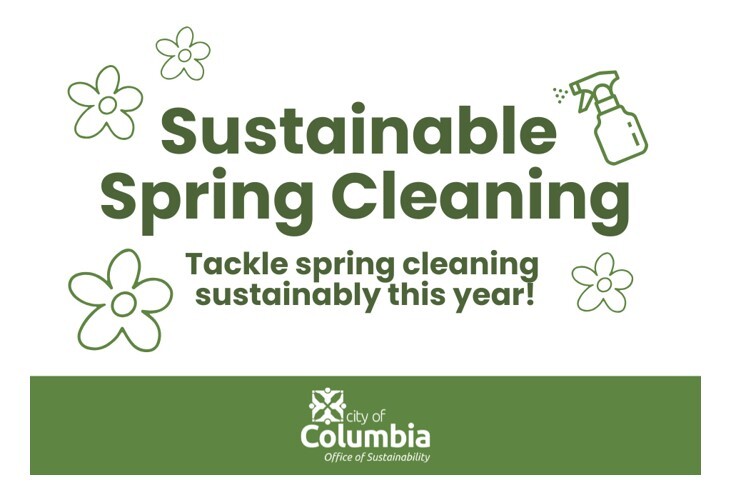Sustainable Spring Cleaning
Spring cleaning is the perfect opportunity to refresh your home and tackle the clutter that’s built up over the year. But this year, why not take your cleaning routine a step further by making it more sustainable? By making a few simple changes, you can reduce waste, save resources, and help create a safer, healthier community. Here are some easy and impactful ways to make your spring cleaning greener than ever before.
When it comes to cleaning, the products you choose can make a huge difference for the environment and your household health. This year, opt for eco-friendly cleaners that are both effective and safer for the planet and your family. The EPA’s Safer Choice program is an excellent resource for finding cleaning products that are formulated with safer ingredients. Products that carry the Safer Choice label meet high standards for both performance and environmental safety. By choosing these products, you can be confident that you're using cleaning solutions that are better for your health and the planet.
- Explore more about Safer Choice and find eco-friendly products here: EPA Safer Choice.
As you clear out your closet for the season, remember that textiles like towels, sheets, curtains, and clothing can all be recycled instead of tossed in the trash. Fabric waste is a significant contributor to landfills, but you can make a positive impact by recycling or donating these items. By recycling or donating fabrics, you can help reduce waste and ensure that those items are repurposed or reused rather than sitting in a landfill.
- Donate textiles to a local thrift store; use our Waste Wizard to find a location nearest to you. Search clothes: https://www.como.gov/utilities/columbias-solid-waste-utility/single-family-home-trash-and-recycling/
Did you know that household leaks can waste nearly 1 trillion gallons of water annually across the country? That's a huge amount of water that could be conserved with a little attention to detail. As part of your spring cleaning routine, take the time to inspect your home for leaks, whether it’s a leaky faucet, running toilet, or hidden pipe issue. Fixing these leaks not only helps save water but can also lower your utility bills. In fact, the EPA’s Fix a Leak Week (March 17-23) is a great time to tackle this task. Learn how to locate and fix leaks with resources from the EPA to make sure you're conserving water all year long.
- Check out the full guide to Fix a Leak Week here: EPA Fix a Leak Week.
Food waste is a significant contributor to climate change, creating potent methane emissions in landfills and increasing your carbon footprint. But you can make a big difference by composting food scraps. Not only does composting help divert waste from landfills, but it also creates nutrient-rich soil that can be used in your garden. Whether you’re composting in your kitchen with a small compost bin or starting a larger composting system in your backyard, you are reducing food waste, supporting healthy soil, and contributing to a more sustainable food system.
- Composting is easy and rewarding, and it isn’t just for gardeners! Composting is a step everyone can take to reduce their carbon footprint. Attend a free workshop and start diverting kitchen scraps and yard waste while producing a nutrient-rich soil amendment. Composting is nature’s way to recycle:
Free Home Composting 101 Classes
- Saturday, March 15 from 11:00 a.m.-12:00 p.m. at the Friendship Missionary Baptist Church
- Tuesday, April 22 from 6:00-7:00 p.m. at the Daniel Boone Regional Library
- Saturday, May 10 from 9:00-10:00 a.m. at the Columbia Farmer’s Market
- Saturday, May 10 from 11:00 a.m.-12:00 p.m. at the Columbia Farmer’s Market
- Sunday, June 1 from 11:00 a.m.-12:00 p.m. Location TBA
- Saturday, June 14 from 9:00-10:00 a.m. at the Capen Park Compost Demonstration Site
- Thursday, July 17 from 6:30-7:30 p.m. at the Ridgeway Neighborhood, Garth & Sexton lots
- Saturday, August 23 from 9:00-10:00 a.m. at the Stormy Meadows Community Garden
This spring, make your cleaning routine sustainable. By using safer cleaning products, recycling textiles, fixing leaks, and starting a composting habit, you’ll be helping to reduce waste, conserve resources, and contribute to a healthier, safer community. Thanks for reading!
Previous Post
Celebrating Energy Efficiency Experts in Columbia
Next Post
Watershed Signs Meandering out into the County!









